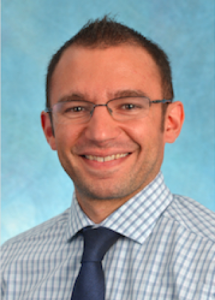Medicine, like any other scientific field, cannot progress forward without the hard work of new, cutting-edge researchers. In the Department of Medicine, three physician scientist trainees are working to improve the lives of patients who have inflammatory bowel disease, cancer, and food allergies.
In light of their promising, hard work, all three have received support from the UNC School of Medicine Physician Scientist Training Program (PSTP) to cultivate their research programs further.
As part of the Forward Together Strategic Plan, the UNC School of Medicine Physician Scientist Training Program (PSTP) supports a small number of clinicians committed to translating research findings to advance the practice of medicine while providing clinical care and teaching. The School of Medicine has been able to support physician scientists at both the resident or fellowship level and the early-stage faculty level through this prestigious program.
In 2021, six physician-scientists were added to the program and this year’s four awardees will join them in receiving funding and mentorship to help them develop successful research programs.
“The 2022 SOM PSTP awardees from the Department of Medicine join a growing list of our fellows and faculty who have won this honor,” said Janet Rubin, MD, Vice Chair of Research in the Department of Medicine. “We are very proud that our brilliant young physicians, dedicated to the critical scientific method, are being recognized with support from the SOM Office of Research for discoveries in clinical health and pathophysiology. Also, I personally want to thank Simon, Jeremy and Erin for their work on their proposals, and for teaching me something every time I have the pleasure of interacting with them.”

Simon M. Gray, MD, PhD, is a fellow in the Division of Gastroenterology and Hepatology, who is interested in inflammatory bowel disease (IBD) and the role that host-microbial interactions play in driving and modulating inflammation in the gut.
He has developed refined mouse models of inflammatory bowel disease that remit and relapse with standard inflammatory bowel disease therapies, and he now seeks to test whether restoring a subset of normal gut bacteria can lead to long-term remission of the disease.
He is completing his post-doctoral fellowship under the mentorship of Dr. R. Balfour Sartor with a focus on identifying and manipulating bacterial functions that influence inflammation of the mucous lining of the mouth, the gastrointestinal tract, or the airway.

Jeremy Meier, MD, PhD, a second-year fellow in the Hematology & Oncology Fellowship Program, has been studying how Chimeric Antigen Receptor-expressing T cells (CAR-T cells) can be used to treat solid tumors in cancer patients. CAR-T cells are T cells that have been genetically engineered to produce an artificial T cell receptor that recognizes a unique cancer antigen. This allows the engineered T cell to better target cancer cells to eradicate them. Historically, CAR-T cells have been less effective in battling solid tumors compared to blood cancers like leukemia and lymphoma.
The award will allow Meier to continue exploring ways to improve the efficacy of CAR-T cells in treating solid tumors. Under the guidance of his mentor Dr. Jonathan Serody, MD, who is the Chief of the Division of Hematology, they are studying the mechanisms behind the formation of memory CAR T cells, which they think might help CAR T cells survive longer in solid tumors and lead to better patient responses. They hope to be able to apply the findings to optimize CAR-T cell products in the future.

Erin Steinbach, MD, PhD, is an instructor in the Division of Rheumatology, Allergy, and Immunology, who is interested in what happens in the gut before, during, and after peanut allergy develops. The gut is lined with a single layer of cells, called intestinal epithelial cells, which provide a barrier to microbes, food, and other things in the environment getting into the body and harming us. However, this single layer of intestinal epithelial cells is meant to be permeable so that we can absorb nutrients and also antigens to educate our immune system.
Interestingly, intestinal epithelial cells from people with peanut allergies are even more permeable than usual, and this seems to predict more severe allergic reactions to peanuts. She wants to know why this happens and what the consequences of it are so that scientists can target this increased permeability in the future to treat or prevent severe allergic reactions to peanuts.
“This support is key during a tenuous time in my young career as I transition to research independence,” said Dr. Steinbach. “Up until now, I have worked within someone else’s lab to perform my experiments. Now I am a lab of one, still relying heavily on my mentors and their resources, but over the next few years I will be expected to establish my own resources. The UNC PSTP Faculty Award gives me protected time, the most coveted resource for physician-scientists, to perform experiments, publish my findings, and apply for and receive the funding needed to become independent.”